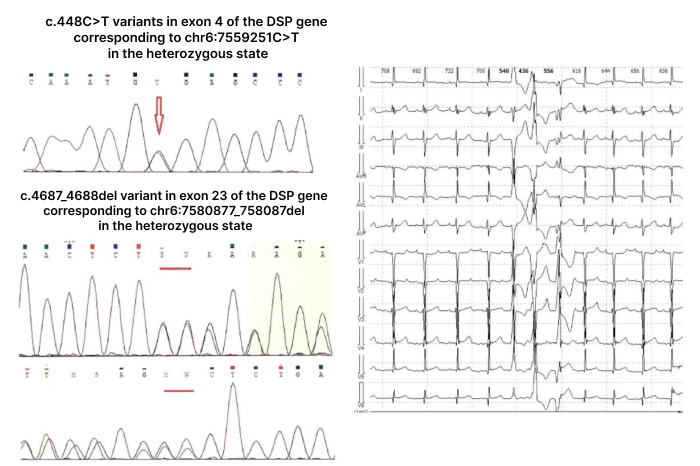
WCRC study results on rare genetic disease in children
Scientists at the WCRC for Personalized Medicine's Unknown, Rare and Genetic Diseases Research Unit have obtained and published (Q1 Journal) unique data from a study of a rare genetic disease with a high risk of sudden cardiac death – arrhythmogenic cardiomyopathy (ACM). This life-threatening arrhythmia is extremely rare in children and its exact prevalence in the pediatric population is still unknown. To date, either isolated cases or small cohorts of pediatric patients with this condition have been described in the literature.
For a long time the disease was described as predominantly involving the right ventricle, but in recent years three phenotypic variants of the disease have been distinguished: of right ventricle, of left ventricle and biventricular. In the article, the researchers characterized 13 pediatric patients with different forms of ACM caused by mutations in both desmosomal (PKP2, DSP, DSG2, JUP) and non-desmosomal genes typical of ACM (FLNC, MYH7, RYR2, SCN5A, SYNE1). In one patient, the left ventricular phenotype of ACM was one of the criteria for Сarvajal syndrome, which occurs in less than 1 in 1,000,000 people.
The researchers identified a number of genetic and phenotypic features of childhood onset: a severe course and rapid disease progression were associated with the presence of pathogenic and probably pathogenic compound mutations, loss-of-function mutations and digenic mutations involving non-desmosomal genes. In addition, a very rare early manifestation of ACM, the 'hot phase', with chest pain episodes and high troponin I levels, was documented. The results of the study showed that using the new "Padua criteria" in combination with genetic testing improved the diagnostic accuracy of ACM in children. In the majority of patients, it was the results of the genetic testing that allowed a timely determination and recommendation of therapy, further management and family cascade screening.
Determining genetic and phenotypic features of pediatric ACM is crucial for clinical prognosis and risk stratification, genetic counselling and decision making on device implantation. It is important to emphasize that the results of the study conducted at the WCRC for Personalized Medicine are the first national data on the study of this disease in children. The WCRC is planning to continue its research into the course of ACM in children.
Article:
Kofeynikova O, Alekseeva D, Vershinina T, Fetisova S, Peregudina O, Kovalchuk T, Yakovleva E, Sokolnikova P, Klyushina A, Chueva K, Kostareva A, Pervunina T, Vasichkina E. The phenotypic and genetic features of arrhythmogenic cardiomyopathy in the pediatric population. Front Cardiovasc Med. 2023 Sep 15;10:1216976. doi: 10.3389/fcvm. 2023.1216976. PMID: 37781308; PMCID: PMC10541206. For access: https://www.frontiersin.org/articles/10.3389/fcvm.2023.1216976/full
30.11.2023
